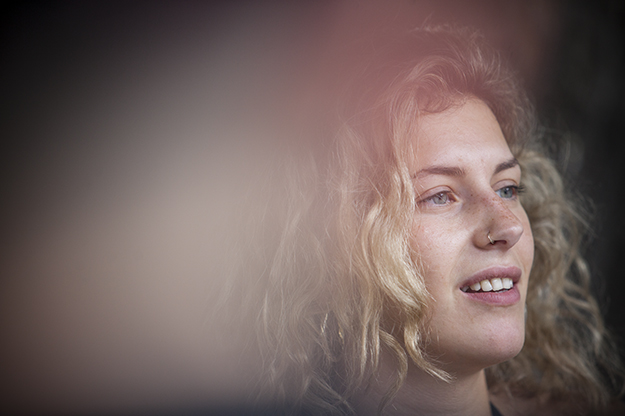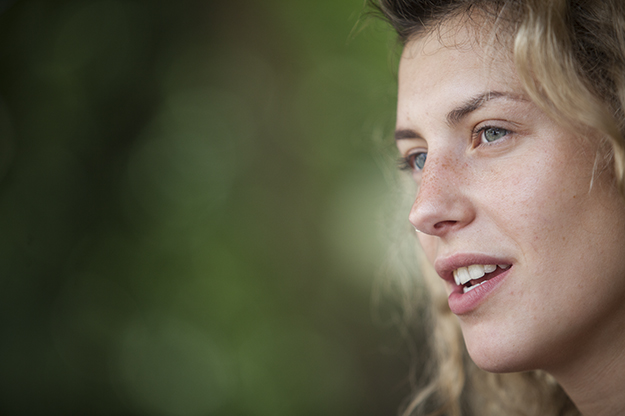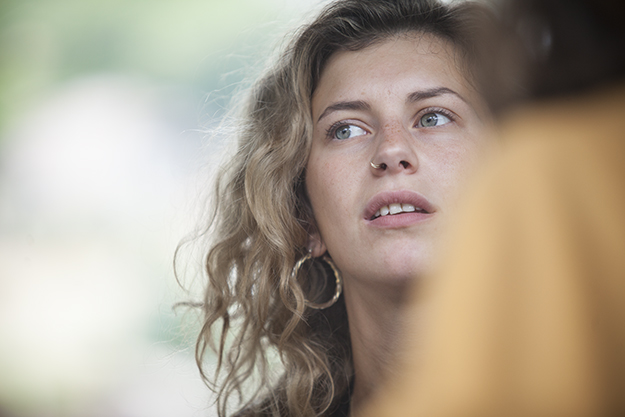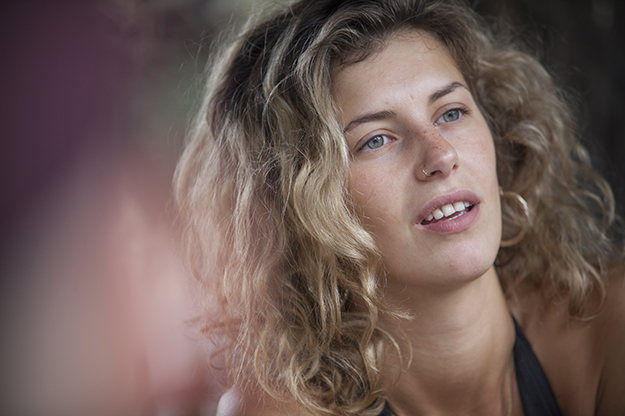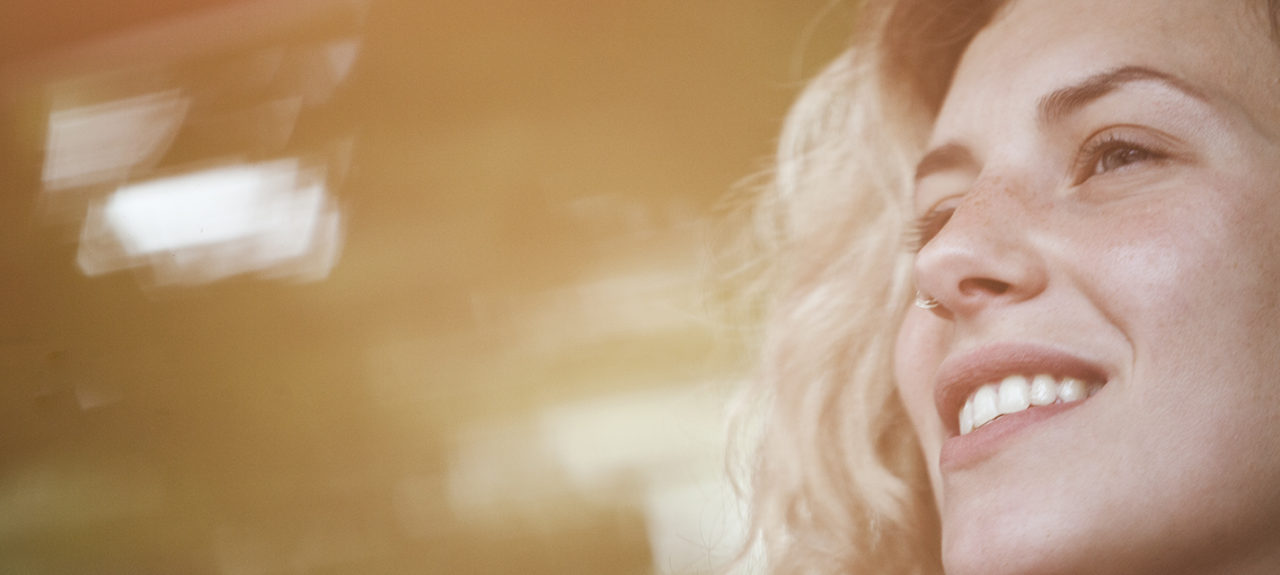Qendresa Sopa, or Qendresa, as she goes by artistically, has done what many other youngsters have had to do to before her to make their way into the music industry: serve coffees here, model there — pay the bills. But now, after around eight years, she has finally got fully hooked by music, which has become her reflection, what she is.
Qendresa’s music has been shared across the internet ever since the release of Shades On, a six track EP produced together with London-based producer Hugo Mari in October 2017. The BBC’s own Gilles Peterson has put their sound across the radio waves and now Qendresa is pushing forward her career as a solo artist on multiple levels, including DJing, writing, singing and producing. She also hosts her own radio show at London-based NTS radio.
Born to Kosovar parents in London, and raised in north London specifically, her mix of influences and her down-to-earth personality are reflected both in real life and through her music and videoclips, expressing an elegant soul.
With her name circulating more and more in the past months in Kosovo, ever since the release of Shades On, tonight she will present a DJ set and live performance together with her partner and producer Rob Mack (a member of King Krule and other music projects) as DokuNight’s opening act at the Andrra stage.
Before Qendresa opens DokuFest’s musical program, K2.0 sat down with her to talk about creating a career in one of the world’s capitals of contemporary music and the process of becoming a musician with a voice without selling your soul to the devils of the industry.
K2.0: Do you come back to Kosovo often? Do you still have a relationship with your family and the city here?
Qendresa: I’ve been coming back every year after the war, but not so much for the last two years because I’ve been busy. My dad is from Ferizaj and my mum is from Obiliq. When I come, I stay with both my dad’s and my mum’s side.
My parents moved to London in ‘89. They had to come secretly. It was quite some stuff going on in Kosovo, so they had to be quite discrete. They got to London and they somehow managed to stay in London and not be sent back.
They had me a year later, and it was lots of living in small spaces with other Kosovar family friends. I think they got granted asylum finally, and here we are, 28 years later.
How does it feel to come back?
It feels good, and now I’m really connected. People message me on Instagram and talk to me when I’m here, they want to meet me. Yesterday we met a nice girl who did my tarot reading. It’s actually better now because now I have a reason to come, besides holidays. Now I have a reason to communicate with the people, and be part of what’s going on here.
This summer you performed at the Turtle Fest in Albania and now you will perform at DokuNights. What kind of experience do you have here with the music?
It’s hard to describe. I used to imagine it when I used to go out in the clubs in Prishtina. I wanted to be a DJ, I wanted to play to my people and my friends, and during summer holidays it was so interesting… And now I’m here.
Have you always lived in London? What do you like about the city?
I like London firstly because it is my home and I identify with it. It’s got everything. Every summer, when I’d be here for a month and then go back I’d be grateful to be from London, just because I see how my family is living here and how it is not exactly easy. So when I go back to London I’m like: I’ve got the world at my fingertips, I need to use this to my advantage.
London has been a cradle to many musicians and bands, even whole musical movements, like grime…
It gives you freedom to be whatever you want in music. I think that’s probably international now, and everyone’s being experimental, but I think London allows you to express yourself any way you want, however you like. Any type of music is accepted.
How do you think this city, and particularly northwest London where you’re from, influenced your start or your evolution in music?
Being from north, northwest London, there is a mixture of two types of [social] classes. There is a very poor, kind of like council-estates, not-wealthy people, and then there is the very wealthy, particularly in northwest London. If you heard about the Grenfell Tower fire, that area, Kensington and Chelsea, is an area where you have super, super rich, and super, super poor.
That inspired me a lot because it gave me a taste of the luxury lifestyle that is very attainable in London, but also the hunger to achieve something because it wasn’t handed to you. In London you see a lot of people that have it handed to them, whether in business or music, whatever. When you’re working by yourself in that city it can really inspire you.
What do you do besides music? Do you get to live off of music?
I never went to university, I went to college and I left. I studied fine arts for a year, and then fashion, and then I was like: I can do this stuff without studying. Plus the good thing about London is that you don’t necessarily need a degree sometimes. If I really wanted to pursue my fashion career — luckily I didn’t! — I’m pretty sure I could have done it if I was really focused.
But I started looking into music, making music with friends, and family, people with whom I studied, and it helped me a lot. I’m not really good at exams and stuff, and with music it was really practical, very hands on, getting right into it and figuring out the formula to create a song.
That’s where I am now, figuring it out, but now I’m doing just music. I was doing waitressing ever since I left school. I was working in restaurants, bars… until last year, when I started DJing, and I did the NTS show and an agent friend of mine put me in their books and I was very lucky, now I just do music.
How did you start making your own music?
I started around seven or eight years ago, with my friends. I was going through a tough time in life. I guess leaving school, not really knowing what I was doing, having Albanian parents that are like, “C’mon you need to go to uni, or do something with your life…”
I hit rock bottom with friendships, relationships, family, not knowing what I am doing. I had a group of friends with whom I am so close now. We went to school together, but we never hung out then ‘cause they were super music nerds and one year older and too cool. But seven years ago we recovered our friendship and started making music in one of their flats. From then it just went up and up and up…
How did your music sound when you started, and how do you think it has evolved?
It has evolved in the sense that I can control my voice more… Sometimes I wish I could go back to that stage when I was in then because there was not so much thinking, it was just expressing in the moment.
Now it is so much more thinking. You think about arrangement, structure. Sometimes when I am recording I am even thinking, ‘how are you going to release this?’ and it’s like: “No! Just be in the moment and make the song!” My tarot reading told me yesterday that I need to stop overthinking and just let go. Just go with the flow. That’s where I am now.
In the beginning you worked on some tracks with a group called Mindset and have also worked with Hugo Mari on the “Shades On” EP. How were these collaborations, and where are they going?
So this group of friends I started working with was Mindset, which included Hugo. That was all of us. Then they all left, and just us two were left.
I wanted to keep it just as Qendresa, my name, and all the friends were like: ‘Yeah, that’s definitely better than Mindset, if it’s just you being at the forefront and the singer, you may as well give it your name and obviously give the producer credits when it’s due.’ Obviously that doesn’t work for the other person though because they want the same amount of recognition, which is understandable — a bit annoying but understandable [laughs].
So now I am just doing my solo thing, and being more firm when I work with producers, I have to be like “this is my song.” Because producers can definitely take your vocals and put you as a feature, or not put you there at all.
If you are trying to grow your career like I am right now, you need to be firm. That was a lesson in the Mindset project, because I was very “oh, the universe is gonna carry me through…” When all my friends left and got serious jobs, I realised I needed to do my own thing.
Now I will be releasing some new songs that need to be mastered and then I will focus on my body of work, on an album.
Your style is not really commercial, not mainstream. How do you reconcile building a career and getting out there with keeping your voice and your identity?
We were talking about London earlier, and it’s kind of good that we’re in London and that I got to do my NTS [radio] show, because there I got to play my own songs and put myself out there. But it is hard because at the same time I kind of never really wanted to be mainstream, so I don’t really wanna push myself there.
But we’re quite lucky in London because we have different kinds of radio stations, so for example we’ve got late night shows that maybe are more fitted to my kind of sound and what I represent. I think I do wanna crack the mainstream but not with my name as the artist. I kind of wanna do it for other artists.
I’ve always wanted to write songs for other artists because then I can be less thinking, and be more open about my emotions, and write a deep pop song but not feel attached to it and give it to whoever to sing it. I struggle quite a lot with attachment to songs I’ve written.
I get a bit attached and I get like: I don’t want to share this, or I do not want someone to think I’m weak. When you write love songs you can come across as very weak… It’s not a bad thing but sometimes I don’t want to.
Some of your videos have a very ’90s feel and vibe in terms of fashion, in sound, in movement. You were born in 1990 though, so how did you come across this ’90s inspiration, and how did you come to embrace it?
For fashion, I can quickly answer that — charity shops in London! I always go in there, everyday, even when I got my money, and there is always ‘90s stuff in there.
With the music, when we were growing up in London the radio had so much good music. Even the shit music was good! Even the cheesy shit like Avril Lavigne is so good. “I’m with you” is a really good song. You know what I mean? Even the cheesiest, cheesiest stuff was good. I made this song the other day and it reminds me of Dido! That era inspires me so much. I think the ’90s inspired me, but the ’80s is what made me wanna make music.
I think it’s because I wasn’t there so when I heard it I was like: ‘What is this?’ But then also when I heard it I felt that this is my kind of song, I love this song. That’s what really made me wanna make music. I obviously heard about many of these songs only eight years ago.
Did not being trained professionally give you any insecurities or affect your creative process?
It used to, I always had Logic but I was always like: “I’m not like my friends.” But now I’m like: This is coming out of me, and I’m gonna play it.
You are kind of multifaceted, you’ve modeled, you’ve sang and produced and you also debuted last February on Boiler Room as a DJ, on Valentine’s Day… You are also taking the waves with a show at NTS Radio where you play a combination of R’n’B, hip hop, slow jams, even pop or house sometimes too. What are you trying to achieve when you are behind the radio desk, when you are at a club playing for a crowd, and when you are at the studio composing for your album? How do these three roles connect? What do you seek in each of them?
When I started modelling I used to hate it, but it was like paying my bills and stuff. I was always like, I wish I was an artist first and then a model. I hated being a model and doing music on the side, I hated that.
I thought that as an artist you can be whatever you want and then as a model you can be a bit chubby, have your own style. But as a model they’d say to me “you’re getting a bit of hip…” and I hated that shit ‘cause I liked my hips.
Now I feel like I’ve got more power, I’ve got the upper-hand, now I DJ, I’ve got my music, I’m not as firm as I sound right now, but I tell people what I want whereas with modelling they tell me what they want from me. Now I say I want this to sound like this and this is the kind of music I’m gonna play for this night. It’s up to me, and that’s what I always wanted, my own power, ‘cause yeah, I hate being told what to do in work.
Even when I first started out doing music I was going first in studio sessions with Zero 7. They were older and they were putting my voice on autotune a lot. I was kind of new and I thought: ‘I thought I had a good voice – but clearly not.’ I had no control in that studio session, I just had to sing what they told me, even if I was writing.
Now I’ve got my control, I say what I want. Obviously I am open to people and to try things, and I love feedback, and the engagement with producers, but yeah, the whole thing is that I wanna have my own control.
Did also being young and a woman influence this type of cooperation and treatment?
Yeah, because being a woman — even amongst friends it happens, even if they don’t mean it — I’ve been talking and they just don’t hear me. It’s sad but it’s how it goes, it’s a lot of work to do but…
R&B is definitely an influence in your music. It’s is a style that is maybe not as mainstream as it was – maybe even techno is today more popular than R&B which to some young generations may even sound like an “old” style. How would you describe contemporary R&B, and the music that you’re making today?
It’s just a fusion of everything. I like to take from Erykah Badu, not so much “to take” but I can’t help that I am influenced by her ‘cause I’ve listened to her so much in recent years as well.
I also try to be present in my upbringing in London. For example when I grew up grime was invented and I was so much there. I wasn’t in any of the radio stations, but I was listening to it whenever I could, and recording it whenever I could, so I’m so proud of saying that grime comes from the city where I was born and now it’s gone worldwide.
I want to kind of make this sort of ’80s, ’90s hip hop, disco-ish, kind of stuff that I love and fuse it with my London upbringing — coming up in not very fortunate neighborhoods, with people around me that come from minorities, refugees… I want to represent that in my R&B somehow.
But I am also very much influenced by Mariah Carey, firstly, ‘cause she was like my hero growing up, and then Erykah Badu, The Roots, A Tribe Called Quest, but then also people like Lou Reed, and stuff like that.
Where are you getting to hear these influences? You’re talking about the city, and the culture, but where do you get to pick up all these sounds? Especially considering your influences from the past decades, and how people at that time accessed music, much more through magazines, TV music shows, radio…
When I first got introduced to all the stuff it was on Youtube, and it’s the best, because you get so many recommendations and sometimes you can’t get these things in record shops. I say I dig much more in Youtube than in a record shop, just because I don’t have a record player, and it takes a lot, I need to completely zone out to go in a record shop. But in Youtube I just navigate…
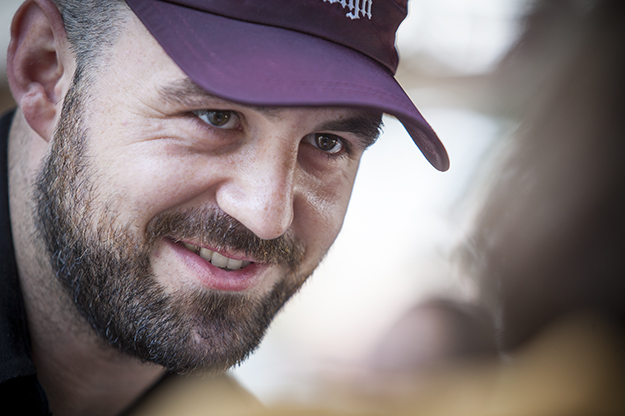
Qendresa’s producer and partner Rob Mack also finds inspiration in his hometown of London, as well as the emergence of a generation of diaspora Kosovars. Photo: Majlinda Hoxha / K2.0.
On your NTS show you play a big variety of music and genres, and I imagine your DJ sets are the same…
That’s London, man.
Rob Mack: When you go to a city like this you have every culture: Jamaican, American, Indian, Turkish…. And when people are born into new generations the way we relate to each other is through culture, through music, and everyone brings their own sensibility, some of my friends are into punk, some are into dubstep, or electronic music, or into jazz or electro funk. It’s just the way friendship groups come together in London, South London, North London, East London…
Qendresa: Every area has a Caribbean influence to a degree. Maybe it was stronger before in the ’80s and ’90s and now it is more associated with afro caribbean, especially some districts like South London…. But if you go out to a London club, even the mainstream clubs play hip hop and trap and stuff, but that’s got more to do now with the fact that pop music is broader.
Now people are open to hip hop or trap, so now when I play I don’t care. I started DJing and I was very nervous in the beginning so I’d play songs that I like: grime, trap, hip hop, soul, altogether… And I’m trying to keep that up but I don’t wanna be too different all the time – but definitely London inspires.
Earlier you were talking about representing that context of migration, of minority, of families that have struggled to settle, as newcomers. You’re a Kosovar Londoner which is trying to make a career in music and, when I came across you to have this interview it was at the time when Rita Ora was visiting Kosovo and Dua Lipa was winning Brit Awards. How do you feel about this “phenomenon?” What do you make of it?
It’s so crazy. I remember when Rita came out we were all so proud, we were really proud, and still are. I think I learned so much about us as a nation, there is nobody like us. One Kosovan can recognize another form ten miles away and be like, “C’mon here, come to my house!” [Laughs].
Rob: As an outsider looking in I find it very interesting, and I am learning a lot from Qendresa with this. I grew up with a lot of Albanians too, seeing different identities, and stuff like this, but the history of this nation is very young, and the repercussions of its history and how it has spread out into the world…
Now you see the new generations of people who have had to grow up at different parts of the world but are still proud and identify with their Kosovan heritage. We see it in music but we see it also in sports: Januzaj, Shaqiri, Xhaka, all of them are proud of where they come from, and they spread the message. For people younger than Qendresa, who are 14 or 15, it is good for them to see that Kosovars can succeed in whatever situation and do: music, sport, fashion, engineering… It’s inspiring.
Without wishing to exoticize your background, do you think that coming from a migrant family has pushed you in any special way to pursue, and to work, ‘cause you didn’t get things for granted?
Definitely yes. When I asked my dad what my name means and he said it was perseverance… ever since he told me that I remember it. And then coming here every year, every summer, and seeing my own family struggle, seeing my cousins who have no prospects… well, not all of them, but it makes me fight harder — for me and for them as well. It kind of pushes you.
When I hear my mother’s stories of them coming here… We came back to Kosovo in 1997, it was my mother’s first time since they left in ’89, and my dad couldn’t come. She came with me, my brother and she was pregnant with my youngest brother as well. We came and the war started.
We had to flee, my parents hid everything from me, they didn’t let me see it in the news or anything. It was very sad, I knew something was up. When we left we had to get a bus to Macedonia and we were at this angry Macedonian house… It was crazy, my mother was heavily pregnant and all that gave me a lot of hunger as well because I actually saw my mum scared… It was a crazy time and yeah, it motivated me a lot.
Can you give a suggestion of a song for our readers to end this interview?
Beauty, by S4U and 808 ink, really good musicians in London now.
This interview has been edited for length and clarity. It was originally conducted in English.K
Feature images: Majlinda Hoxha / K2.0.

